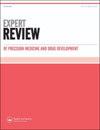精准医疗在癌症治疗中的新作用
IF 1.2
Q4 PHARMACOLOGY & PHARMACY
Expert Review of Precision Medicine and Drug Development
Pub Date : 2020-06-05
DOI:10.1080/23808993.2020.1777854
引用次数: 3
摘要
摘要简介癌症是全球女性癌症死亡的主要原因,通常诊断为晚期。尽管目前基于广泛的细胞减灭术和全身化疗的标准治疗导致了高的完全缓解率,但复发极为频繁,并表现出进行性化疗耐药性,因此构成了困难的临床挑战。所涵盖的领域在精准医疗时代,癌症基因组学、蛋白质组学和免疫环境的知识不断增加,促进了新靶向治疗的发展(如抗血管生成药物、PARP抑制剂、免疫疗法、叶酸受体抑制剂、生长因子信号抑制剂),这可能会改善卵巢癌症的治疗模式。专家意见在这篇综述文章中,我们讨论了卵巢癌症治疗的最新进展,强调了对现代、个性化和多学科方法的需求,以及对新的预测性生物标志物的需求,这将使我们能够在化疗、分子靶向药物和免疫疗法之间为每位患者选择最佳治疗方案。未来,靶向治疗的现代组合将为卵巢癌症患者打开新的机会。主要目标是将一种侵袭性疾病最终转变为可控制的慢性疾病。本文章由计算机程序翻译,如有差异,请以英文原文为准。
The emerging role of precision medicine in the treatment of ovarian cancer
ABSTRACT Introduction Ovarian cancer is the primary cause of gynecologic cancer death in women worldwide and it is generally diagnosed at an advanced stage. Although the current standard treatment based on extensive cytoreductive surgery and systemic chemotherapy results in a high complete remission rate, recurrences are extremely frequent and exhibit progressive chemotherapy resistance, thus posing a difficult clinical challenge. Areas covered In the era of precision medicine, the increasing knowledge of cancer genomics, proteomics, and immune milieu facilitated the development of new targeted therapies (e.g. antiangiogenic drugs, PARP inhibitors, immunotherapy, folate receptor inhibitors, growth factor signaling inhibitors), that could improve ovarian cancer paradigm of care. Expert opinion In this review article, we discuss recent advances in the management of ovarian cancer, highlighting the need for a modern, personalized, and multi-disciplinary approach and for new predictive biological markers that will allow to choose the best therapeutic option between chemotherapy, molecular targeted agents, and immunotherapy for each patient. In the future, modern combinations of targeted therapies will open new chances for ovarian cancer patients. The main goal is to turn an aggressive disease eventually into a manageable chronic condition.
求助全文
通过发布文献求助,成功后即可免费获取论文全文。
去求助
来源期刊

Expert Review of Precision Medicine and Drug Development
PHARMACOLOGY & PHARMACY-
CiteScore
2.30
自引率
0.00%
发文量
9
期刊介绍:
Expert Review of Precision Medicine and Drug Development publishes primarily review articles covering the development and clinical application of medicine to be used in a personalized therapy setting; in addition, the journal also publishes original research and commentary-style articles. In an era where medicine is recognizing that a one-size-fits-all approach is not always appropriate, it has become necessary to identify patients responsive to treatments and treat patient populations using a tailored approach. Areas covered include: Development and application of drugs targeted to specific genotypes and populations, as well as advanced diagnostic technologies and significant biomarkers that aid in this. Clinical trials and case studies within personalized therapy and drug development. Screening, prediction and prevention of disease, prediction of adverse events, treatment monitoring, effects of metabolomics and microbiomics on treatment. Secondary population research, genome-wide association studies, disease–gene association studies, personal genome technologies. Ethical and cost–benefit issues, the impact to healthcare and business infrastructure, and regulatory issues.
 求助内容:
求助内容: 应助结果提醒方式:
应助结果提醒方式:


